146233744123届四级五级完型填空练习(一)学生版
- 格式:pdf
- 大小:450.96 KB
- 文档页数:30
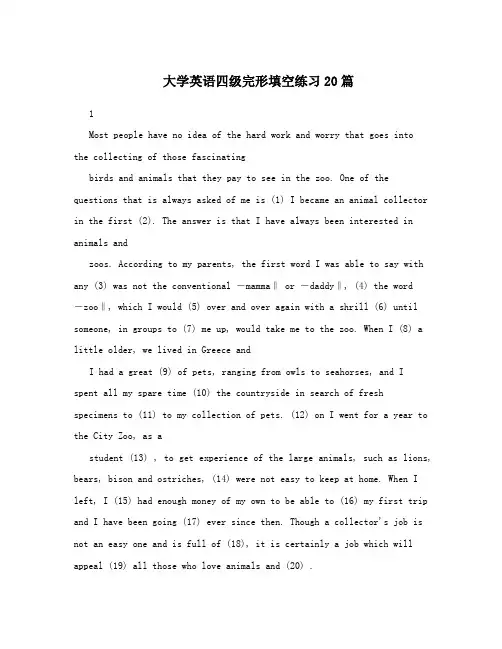
大学英语四级完形填空练习20篇1Most people have no idea of the hard work and worry that goes intothe collecting of those fascinatingbirds and animals that they pay to see in the zoo. One of the questions that is always asked of me is (1) I became an animal collector in the first (2). The answer is that I have always been interested in animals andzoos. According to my parents, the first word I was able to say with any (3) was not the conventional ―mamma‖ or ―daddy‖, (4) the word―zoo‖, which I would (5) over and ov er again with a shrill (6) until someone, in groups to (7) me up, would take me to the zoo. When I (8) a little older, we lived in Greece andI had a great (9) of pets, ranging from owls to seahorses, and Ispent all my spare time (10) the countryside in search of fresh specimens to (11) to my collection of pets. (12) on I went for a year to the City Zoo, as astudent (13) , to get experience of the large animals, such as lions, bears, bison and ostriches, (14) were not easy to keep at home. When I left, I (15) had enough money of my own to be able to (16) my first trip and I have been going (17) ever since then. Though a collector's job is not an easy one and is full of (18), it is certainly a job which will appeal (19) all those who love animals and (20) .1.A.how B. where C. when D. whether2.A.region B. field C. place D. case3.A.clarity B. emotion C. sentiment D. affection4.A.except B. but C. except for D. but for5.A.recite B. recognize C. read D. repeat6.A.volume B. noise C. voice D. pitch7.A.close B. shut C. stop D. comfort8.A.grew B. was growing C. grow D. grown 9.A.many B. amount C.number D. supply10.A.living B. cultivating C. reclaiming D. exploring 11.A.increaseB. includeC. addD. enrich ter B. further C. then D. subsequently 13.A.attendant B. keeper C. member D. aide 14.A.who B. theyC. of whichD. which15.A.luckily B. gladly C. nearly D. successfully 16.A.pay B. provideC. allowD. finance 17.A.normally B. regularly C. usually D. often18.A.expectations B. sorrows C. excitement D. disappointments 19.A.for B. with C. to D. from20.A.excursion B. travel C. journey D. Trip1.【答案】A【解析】根据下一句及随后的内容,作者讲的是怎样成为动物爱好者的(从小就喜欢动物),应当选择A.how。
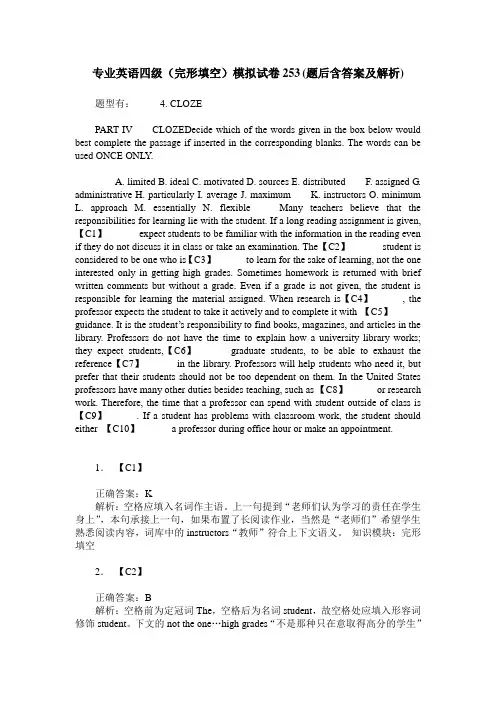
专业英语四级(完形填空)模拟试卷253(题后含答案及解析)题型有: 4. CLOZEPART IV CLOZEDecide which of the words given in the box below would best complete the passage if inserted in the corresponding blanks. The words can be used ONCE ONLY.A. limitedB. idealC. motivatedD. sourcesE. distributedF. assignedG. administrativeH. particularlyI. averageJ. maximumK. instructors O. minimumL. approachM. essentiallyN. flexible Many teachers believe that the responsibilities for learning lie with the student. If a long reading assignment is given,【C1】______ expect students to be familiar with the information in the reading even if they do not discuss it in class or take an examination. The【C2】______ student is considered to be one who is【C3】______ to learn for the sake of learning, not the one interested only in getting high grades. Sometimes homework is returned with brief written comments but without a grade. Even if a grade is not given, the student is responsible for learning the material assigned. When research is【C4】______, the professor expects the student to take it actively and to complete it with 【C5】______ guidance. It is the student’s responsibility to find books, magazines, and articles in the library. Professors do not have the time to explain how a university library works; they expect students,【C6】______ graduate students, to be able to exhaust the reference【C7】______ in the library. Professors will help students who need it, but prefer that their students should not be too dependent on them. In the United States professors have many other duties besides teaching, such as 【C8】______ or research work. Therefore, the time that a professor can spend with student outside of class is 【C9】______. If a student has problems with classroom work, the student should either 【C10】______ a professor during office hour or make an appointment.1.【C1】正确答案:K解析:空格应填入名词作主语。
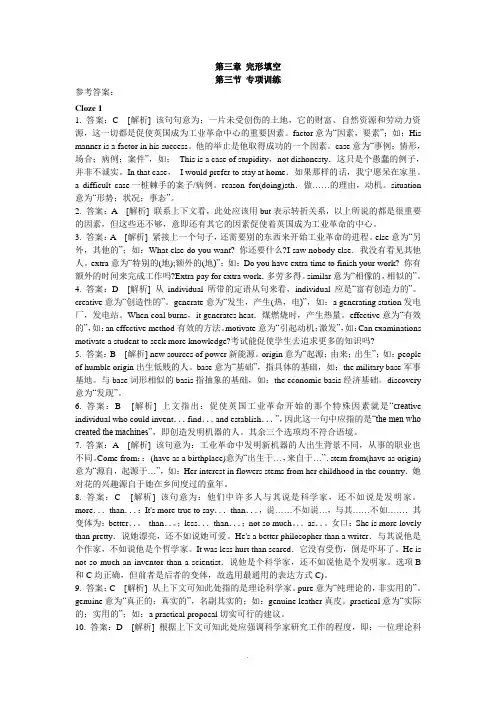
第三章完形填空第三节专项训练参考答案:Cloze 11. 答案:C [解析] 该句句意为;一片未受创伤的土地,它的财富、自然资源和劳动力资源,这一切都是促使英国成为工业革命中心的重要因素。
factor意为“因素,要素”;如;His manner is a factor in his success。
他的举止是他取得成功的一个因素。
case意为“事例;情形,场合;病例;案件”,如;This is a case of stupidity,not dishonesty.这只是个愚蠢的例子,并非不诚实。
In that case,I would prefer to stay at home.如果那样的话,我宁愿呆在家里。
a difficult case一桩棘手的案子/病例。
reason for(doing)sth.做……的理由,动机。
situation 意为“形势;状况;事态”。
2. 答案:A [解析] 联系上下文看,此处应该用but表示转折关系,以上所说的都是很重要的因素,但这些还不够,意即还有其它的因素促使着英国成为工业革命的中心。
3. 答案:A [解析] 紧接上一个句子,还需要别的东西来开始工业革命的进程。
else意为“另外,其他的”;如:What else do you want? 你还要什么?I saw nobody else.我没有看见其他人。
extra意为“特别的(地);额外的(地)”;如;Do you have extra time to finish your work? 你有额外的时间来完成工作吗?Extra pay for extra work.多劳多得。
similar意为“相像的,相似的”。
4. 答案:D [解析] 从individual所带的定语从句来看,individual应是“富有创造力的”。
creative意为“创造性的”。
generate意为“发生,产生(热,电)”,如:a generating station发电厂,发电站。
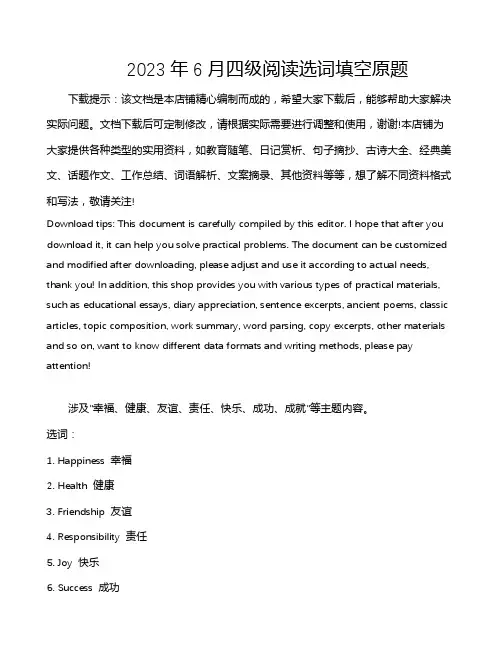
2023年6月四级阅读选词填空原题下载提示:该文档是本店铺精心编制而成的,希望大家下载后,能够帮助大家解决实际问题。
文档下载后可定制修改,请根据实际需要进行调整和使用,谢谢!本店铺为大家提供各种类型的实用资料,如教育随笔、日记赏析、句子摘抄、古诗大全、经典美文、话题作文、工作总结、词语解析、文案摘录、其他资料等等,想了解不同资料格式和写法,敬请关注!Download tips: This document is carefully compiled by this editor. I hope that after you download it, it can help you solve practical problems. The document can be customized and modified after downloading, please adjust and use it according to actual needs, thank you! In addition, this shop provides you with various types of practical materials, such as educational essays, diary appreciation, sentence excerpts, ancient poems, classic articles, topic composition, work summary, word parsing, copy excerpts, other materials and so on, want to know different data formats and writing methods, please pay attention!涉及"幸福、健康、友谊、责任、快乐、成功、成就"等主题内容。
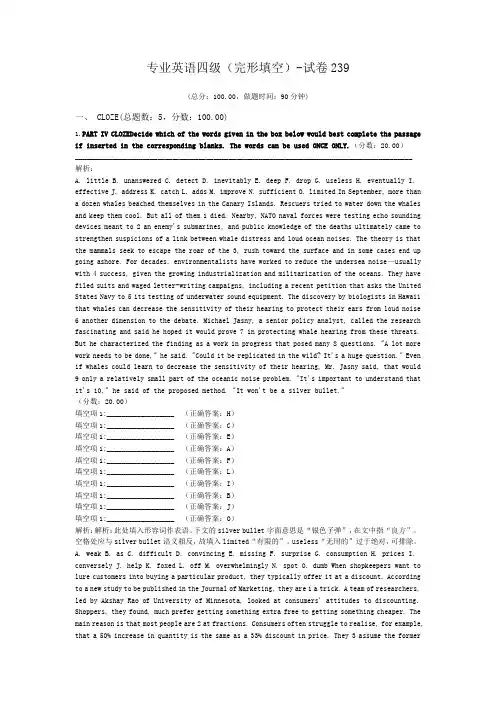
专业英语四级(完形填空)-试卷239(总分:100.00,做题时间:90分钟)一、 CLOZE(总题数:5,分数:100.00)1.PART IV CLOZEDecide which of the words given in the box below would best complete the passage if inserted in the corresponding blanks. The words can be used ONCE ONLY.(分数:20.00)__________________________________________________________________________________________解析:A. littleB. unansweredC. detectD. inevitablyE. deepF. dropG. uselessH. eventuallyI. effectiveJ. addressK. catchL. addsM. improveN. sufficientO. limited In September, more than a dozen whales beached themselves in the Canary Islands. Rescuers tried to water down the whales and keep them cool. But all of them 1 died. Nearby, NATO naval forces were testing echo sounding devices meant to 2 an enemy's submarines, and public knowledge of the deaths ultimately came to strengthen suspicions of a link between whale distress and loud ocean noises. The theory is that the mammals seek to escape the roar of the 3, rush toward the surface and in some cases end up going ashore. For decades, environmentalists have worked to reduce the undersea noise—usually with 4 success, given the growing industrialization and militarization of the oceans. They have filed suits and waged letter-writing campaigns, including a recent petition that asks the United States Navy to 5 its testing of underwater sound equipment. The discovery by biologists in Hawaii that whales can decrease the sensitivity of their hearing to protect their ears from loud noise 6 another dimension to the debate. Michael Jasny, a senior policy analyst, called the research fascinating and said he hoped it would prove 7 in protecting whale hearing from these threats. But he characterized the finding as a work in progress that posed many 8 questions. "A lot more work needs to be done," he said. "Could it be replicated in the wild? It's a huge question." Even if whales could learn to decrease the sensitivity of their hearing, Mr. Jasny said, that would 9 only a relatively small part of the oceanic noise problem. "It's important to understand that it's 10," he said of the proposed method. "It won't be a silver bullet."(分数:20.00)填空项1:__________________ (正确答案:H)填空项1:__________________ (正确答案:C)填空项1:__________________ (正确答案:E)填空项1:__________________ (正确答案:A)填空项1:__________________ (正确答案:F)填空项1:__________________ (正确答案:L)填空项1:__________________ (正确答案:I)填空项1:__________________ (正确答案:B)填空项1:__________________ (正确答案:J)填空项1:__________________ (正确答案:O)解析:解析:此处填入形容词作表语。
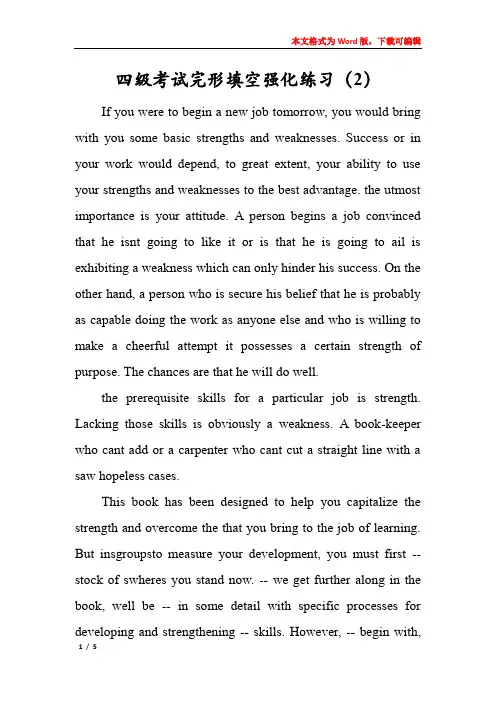
四级考试完形填空强化练习(2)If you were to begin a new job tomorrow, you would bring with you some basic strengths and weaknesses. Success or in your work would depend, to great extent, your ability to use your strengths and weaknesses to the best advantage. the utmost importance is your attitude. A person begins a job convinced that he isnt going to like it or is that he is going to ail is exhibiting a weakness which can only hinder his success. On the other hand, a person who is secure his belief that he is probably as capable doing the work as anyone else and who is willing to make a cheerful attempt it possesses a certain strength of purpose. The chances are that he will do well.the prerequisite skills for a particular job is strength. Lacking those skills is obviously a weakness. A book-keeper who cant add or a carpenter who cant cut a straight line with a saw hopeless cases.This book has been designed to help you capitalize the strength and overcome the that you bring to the job of learning. But insgroupsto measure your development, you must first --stock of swheres you stand now. -- we get further along in the book, well be --in some detail with specific processes for developing and strengthening -- skills. However, -- begin with,you should pause --examine your present strengths and weaknesses in three areas that are critical to your success or failure in school: your --, your reading and communication skills, and your study habits.1.A.improvement B. victory C. failure D. achievement2.A.a B. the C. some D. certain3.A.in B. on C. of D. to4.A.Out of B. Of C. To D. Into5.A.who B. what C. that D. which6.A.ensure B. certain C. sure D. surely7.A.onto B. on C. off D. in8.A.to B. at C. of D. for9.A.near B. on C. by D. at10.A.Have B. Had C. Having D. Had been11.A.being B. been C. are D. is12.A.except B. but C. for D. on13.A.idea B. weakness C. strength D. advantage14.A.make B. take C. do D. give15.A.as B. till C. over D. out16.A.deal B. dealt C. be dealt D. dealing17.A.learnt B. learned C. learning D. learn18.A.around B. to C. from D. beside19.A.to B. onto C. into D. with20.A.intelligence B. work C. attitude D. weaknessCloze Test 21.C【解析】本句的意思是:胜利或失败在很大程度上取决于你是否能扬长避短。
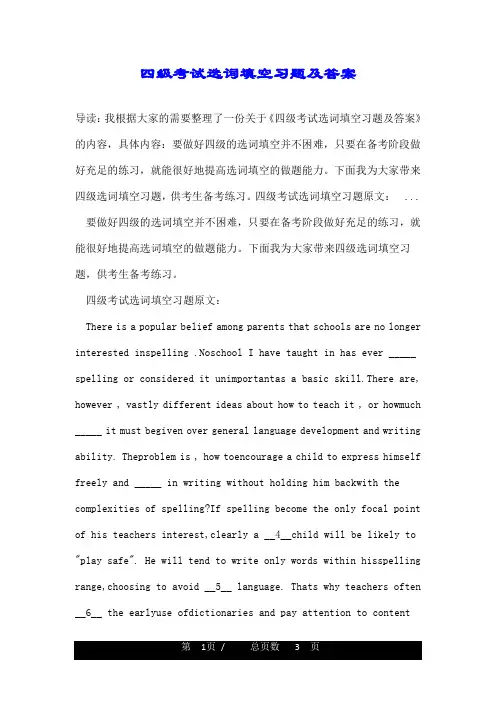
1 3 四级考试选词填空习题及答案 导读:我根据大家的需要整理了一份关于《四级考试选词填空习题及答案》的内容,具体内容:要做好四级的选词填空并不困难,只要在备考阶段做好充足的练习,就能很好地提高选词填空的做题能力。下面我为大家带来四级选词填空习题,供考生备考练习。四级考试选词填空习题原文: ... 要做好四级的选词填空并不困难,只要在备考阶段做好充足的练习,就能很好地提高选词填空的做题能力。下面我为大家带来四级选词填空习题,供考生备考练习。 四级考试选词填空习题原文: There is a popular belief among parents that schools are no longer interested inspelling .Noschool I have taught in has ever _____ spelling or considered it unimportantas a basic skill.There are, however , vastly different ideas about how to teach it , or howmuch _____ it must begiven over general language development and writing ability. Theproblem is , how toencourage a child to express himself freely and _____ in writing without holding him backwith the complexities of spelling?If spelling become the only focal point of his teachers interest,clearly a __4__child will be likely to "play safe". He will tend to write only words within hisspelling range,choosing to avoid __5__ language. Thats why teachers often __6__ the earlyuse ofdictionaries and pay attention to content 2 3
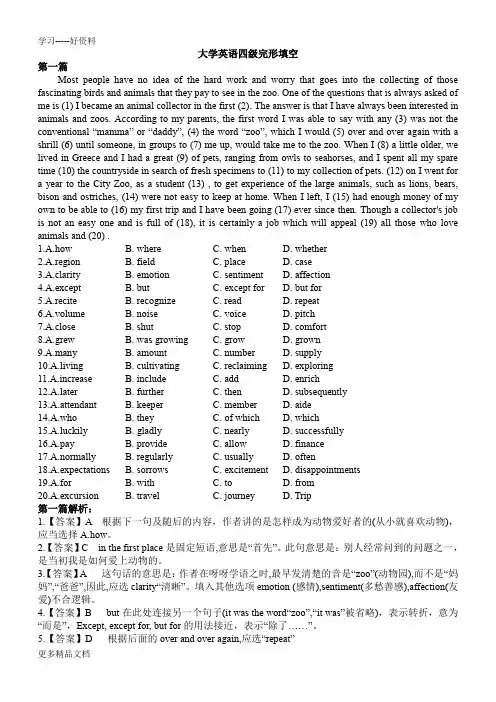
大学英语四级完形填空第一篇Most people have no idea of the hard work and worry that goes into the collecting of those fascinating birds and animals that they pay to see in the zoo. One of the questions that is always asked of me is (1) I became an animal collector in the first (2). The answer is that I have always been interested in animals and zoos. According to my parents, the first word I was able to say with any (3) was not the conventional “mamma” or “daddy”, (4) the word “zoo”, which I would (5) over and over ag ain with a shrill (6) until someone, in groups to (7) me up, would take me to the zoo. When I (8) a little older, we lived in Greece and I had a great (9) of pets, ranging from owls to seahorses, and I spent all my spare time (10) the countryside in search of fresh specimens to (11) to my collection of pets. (12) on I went for a year to the City Zoo, as a student (13) , to get experience of the large animals, such as lions, bears, bison and ostriches, (14) were not easy to keep at home. When I left, I (15) had enough money of my own to be able to (16) my first trip and I have been going (17) ever since then. Though a collector's job is not an easy one and is full of (18), it is certainly a job which will appeal (19) all those who love animals and (20) .1.A.how B. where C. when D. whether2.A.region B. field C. place D. case3.A.clarity B. emotion C. sentiment D. affection4.A.except B. but C. except for D. but for5.A.recite B. recognize C. read D. repeat6.A.volume B. noise C. voice D. pitch7.A.close B. shut C. stop D. comfort8.A.grew B. was growing C. grow D. grown9.A.many B. amount C. number D. supply10.A.living B. cultivating C. reclaiming D. exploring11.A.increase B. include C. add D. enrichter B. further C. then D. subsequently13.A.attendant B. keeper C. member D. aide14.A.who B. they C. of which D. which15.A.luckily B. gladly C. nearly D. successfully16.A.pay B. provide C. allow D. finance17.A.normally B. regularly C. usually D. often18.A.expectations B. sorrows C. excitement D. disappointments19.A.for B. with C. to D. from20.A.excursion B. travel C. journey D. Trip第一篇解析:1.【答案】A 根据下一句及随后的内容,作者讲的是怎样成为动物爱好者的(从小就喜欢动物),应当选择A.how。
尚博堂教育新课标四级五级完型填空练习(冲刺上)1要求:1.每天1篇,在每篇完型填空序号前写上当天日期,答案写在每题序号前2.做~改~读2-3遍(感受考点和重点)3.坚持1
Different things usually stand for different feelings. Red, for example, is the color of fire, heat,blood and life. People say red is an exciting and active color. They associate(使发生联系)red with a strong feeling like 1 . Red is used for signs of 2 , such as STOP signs and fire engines. Orange is the bright, warm color of 3 in autumn. People say orange is a 4 color. They associate orange with happiness. Yellow is the color of__5__. People say it is a cheerful color. They associate yellow too, with happiness. Green is the cool color of grass in__6__. People say it is a refreshing color. In general, people__7__two groups of colors: warm colors and cool colors. The warm colorsare red, orange and__8__.Where there are warm color and a lot of light, people usually want to be__9__. Those who like to be with__10 _like red. The cool colors are __11_and blue. Where are these colors, people are usually worried. Some scientists saythat time seems to__12 _more slowly in a room with warm colors. They suggest that a warm color is a good__13_for a living room or a __14_.People who are having a rest or are eating do not want time to pass quickly.__15 colors are better for someoffices if the people working there want time to pass quickly.1. A. sadnessB. angerC. administrationD. smile2. A. roads B. ways C. danger D. places 3. A. landB. leaves C. grass D. mountains4. A. lively B. dark C. noisy D.frightening 5. A. moonlight B. light C. sunlight D. stars 6. A. summer B. spring C. autumnD. winter 7. A. speak B. say C. talk aboutD. tell 8. A. greenB. yellow C. white D. gray 9. A. calm B. sleepy C. active D. helpful10.A. the other B. another C. other one D. others 11. A. blackB. green C. golden D. yellow 12. A. go round B. go by C. go off D. go along 13. A. one B. way C. fact D. matter 14. A. factory B. classroom C. restaurant D.hospital 15. A. Different B. Cool C. Warm D. All2
Charlie came from a poor village. His parents had __1__ money to send him to school when he was young. The boy was very sad. Mr. King lived next to him. He found the boy __2__ and had pity on him and lent some money to him. So the boy could go to school. He studied hard and __3__ all his lessons. When he finished middle school, the man introduced him to his friend in the town. And he began to work.Once Mr. King was seriously hurt in an accident. Dying, he asked Charlie to take care of his daughter, Sharon. The young man __4__and several years later he married the girl. He loved her very much and tried his best to make her happy. He often bought beautiful clothes and delicious food for her. He was good at cooking and he cooked __5__ for her. So she became very fat and she felt it difficult to walk. And one day she found there was something wrong with her heart. Her husband wasn’t at home and she had to go to __6__at once. The doctors looked her over and told her __7__ eat meat, sugar, chocolate and things like these. She was afraid __8__ the doctor’s words and wrote all the names of the food on the paper. When she got home, she put the list on the table and __9__. When she returned home that afternoon, she found many kinds of food: meat, sugar and chocolate in the kitchen. Charlie was busy __10__there. As soon as he saw her, he said happily, “I’ve bought all the food you like, dear!”1. A. noB. someC. muchD. enough 尚博堂教育新课标四级五级完型填空练习(冲刺上)22. A. lazyB. cleverC. carefulD. hard3. A. did well inB. was poor atC. was workingD. was good for4. A. was angryB. thought hardC. agreedD. said “No.”5. A. a littleB. a fewC. manyD. a lot6. A. rest B. sleepC. hospitalD. work7. A. should B. wouldC. to D. not to8. A. to rememberB. to forgetC. to catchD. to teach9. A. sleptB. went outC. cookedD. ate10. A. readingB. seeingC. cookingD. writing3
Why do I want to go to college? No one has ever asked me __1 _a question. But many times I have asked myself. I have __2__ a whole variety of reasons. __3__ important reason is that I want to be a better man. Many things make human beings different __4__ or better than or even superior to animals. One of the most important things is __5__. If I fail to receive higher education, my education __6__. As I want to be a fully __7__ man, I must get a well-rounded education, which good colleges and universities are supposed to __8__. I know one can get educated in many ways, but colleges and universities are __9__ the best places to teach me how to educate myself. Only when I am well-educated, will I be a better human being and __10__fit into society.1. A. quiteB. soC. suchD. another2. A. come up withB. agreedwithC. been fed up withD. got on well with3. A. Most B. The mostC. MoreD. Much4. A. toB. aroundC. betweenD. from5. A. educationB. weatherC. temperatureD. science6. A. finishedB. don’t finishC. will not finishD. has finished7. A. developB. developedC.developingD. experience8. A. improveB. graduateC. hearD. provide9. A. betweenB. amongC. insideD. outside10. A. can goodB. may betterC. be able to betterD. be able to best4